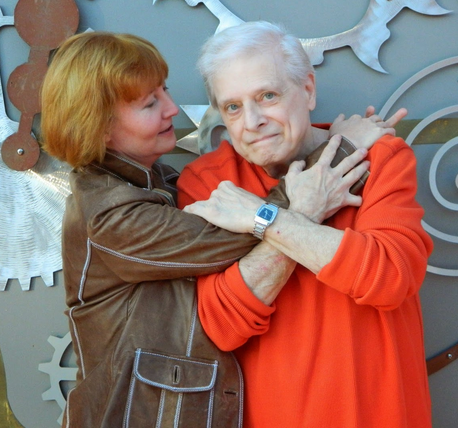
What Harlan Ellison (STILL) Means To Me
By Chris M. Barkley
“The only thing worth writing about is people. People. Human beings. Men and women whose individuality must be created, line by line, insight by insight. If you do not do it, the story is a failure. […] There is no nobler chore in the universe than holding up the mirror of reality and turning it slightly, so we have a new and different perception of the commonplace, the everyday, the ‘normal’, the obvious. People are reflected in the glass. The fantasy situation into which you thrust them is the mirror itself. And what we are shown should illuminate and alter our perception of the world around us. Failing that, you have failed totally.”
― Harlan Ellison
And what exactly is the art of writing? Because people have been freaking out over the process for many millennia.
Including myself.
Until I had a near-death experience at the age of forty in October of 1996, I hadn’t really given the matter much thought. But surviving that event, the cataclysmic, coma induced diabetic, bitch slap my body gave me for abusing it so terribly for decades, was enough to give me pause about who I was and what I wanted to do with whatever time I had left on this mortal coil.
Writing, which until that point in my life had been an interesting little sidebar I dabbled in, became an integral and driving force since then.
The late William H. Gass (1924-2017), who is still regarded in many circles as one of the most highly regarded literary writers who ever lived, compared the process of writing to alchemy, saying, “The true alchemists do not change lead into gold; they change the world into words.”
Which brings us to the late Harlan Ellison, whose 90th birthday we celebrate today. He had an entirely different take on the matter:
“Writing is the hardest work in the world. I have been a bricklayer and a truck driver, and I tell you – as if you haven’t been told a million times already – that writing is harder. Lonelier. And nobler and more enriching.”
–– Harlan Ellison
With all due respect to Mr. Gass, I’m siding with Mr. Ellison on this point.
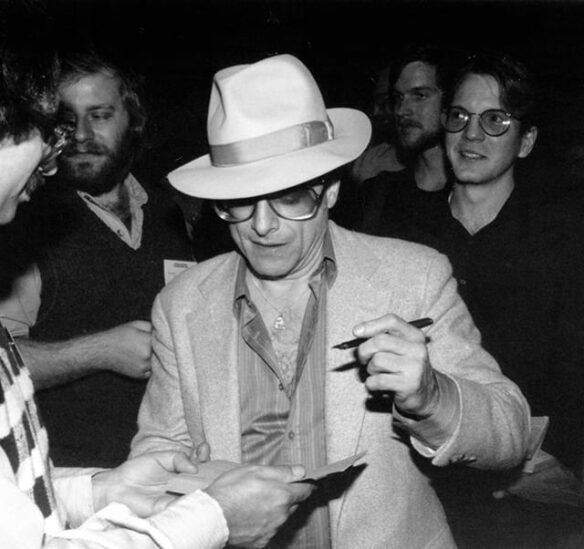
To say that Harlan Jay Ellison was, no, wait, still is, a huge influence in my life would be a huge understatement. In going through my archives of my memories of him, I came across this, one of my favorite anecdotes about him, that directly affected me, can be found in my 2019 Windycon Fan Guest of Honor Speech, which is linked here.
I first met Harlan in 1978 at Kubla Khan 5 in Nashville, Tennessee. Like countless other people, I found him to be a brilliant writer of fiction and essays, a dynamic personality and above nearly all of his other talents, an amazing and brilliant raconteur.
One story he shared with the audience at that convention was burned into my synapses forever, an incident he had experienced at Chicago’s O’Hare Airport. Harlan had just finished doing his “business” in a washroom when he noticed out of the corner of his eye that a middle-aged patron was leaving without washing his hands.
Now THIS greatly offended Harlan since, if anything, he was a real stickler for health and cleanliness.
“Hey! You”, he said in his loud, nasally, faux-Brooklyn accent. “You forgot to wash your hands!”
The man in question turned and said something incredibly rude about Harlan’s parentage and proceeded to walk out into the terminal.
Enraged at this person’s intransigence, Harlan burst out of the restroom and trailed behind the man screaming at the top of his lungs, “UNCLEAN, UNCLEAN! DON’T TOUCH HIM! HE DIDN’T WASH HIS HANDS!”
And he did this. All the way to this person’s departure gate.
Now, I told you that story to tell you this one: For Chicon 2000, I was promoted from my regular duties in the Worldcon Press Office to serve on Chairman Tom Veal’s staff AND as the Fairmont Hotel liaison. It was a very important position, which I shared with my ex-wife, in that both the Masquerade and the Hugo Award Ceremony were being held there.
One afternoon, I was finishing my “business” in the restroom, when I noticed out of the corner of my eye, a middle-aged fan was leaving without washing his hands.
My mind immediately flashed back to Harlan’s story. My first thought was, I am NOT Harlan Ellison. And then my second thought was, “What would Harlan do?”
So, within a few seconds, I screwed up my moral courage and, in my even tempered, faux-midwestern black accent, I spoke up and said, “Excuse me, but you forgot to wash your hands.”
The fan whirled around and shouted, “YOU’RE NOT MY DAD!”
Needless to say, I was taken aback. But fortunately, my skills as a radio talk show host and a standup comedian kicked into high gear:
“You see this?” I pointed to the bright blue COMMITTEE ribbon hanging on my convention badge and stated with absolute authority:
“While you’re here at this convention, this ribbon says I AM YOUR DAD!!”
The fan sighed, turned and washed his hands.
“You must never be afraid to go there.”
― Harlan Ellison
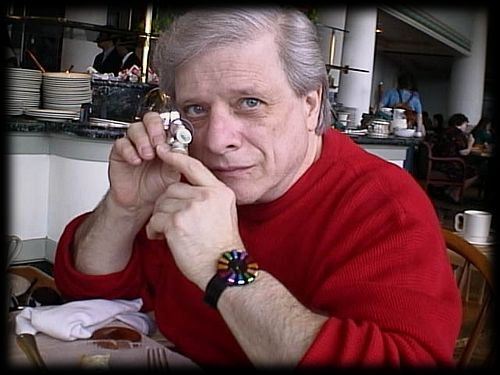
I have recounted here before that the very first story of his I read was in the summer of 1972 (courtesy of my good friend and fellow File 770 columnist Michaele Jordan), was one his most infamous stories, the 1969 novella “A Boy and His Dog”. It featured in her paperback copy of the 1970 edition of World’s Best Science Fiction edited by Donald Wollheim and Terry Carr. Needless to say, my fifteen-year-old mind was blown wide open.
(I tend to think she gave me this particular story to read ON PURPOSE, like a good friend should. Thanks Again, Michaele…)
Harlan Ellison immediately became, and in many ways still is, my favorite writer. And it was a great time to discover his works; Again, Dangerous Visions and Alone Against Tomorrow (1972), Approaching Oblivion (1974), Deathbird Stories and No Door, No Windows (1975), The Illustrated Harlan Ellison and Strange Wine (1978) and that’s only the fiction published during that period.
After devouring those books, I went back and discovered earlier collections; Ellison Wonderland, I Have No Mouth, and I Must Scream and The Beast That Shouted Love at the Heart of the World amaze me to this day.
And who am I to argue that “‘Repent, Harlequin!’, Said the Ticktockman” is NOT one of the greatest short stories ever written?
Harlan’s non-fiction works, such as his fascinating books of essays on television, The Glass Teat (1970) and The Other Glass Teat (1975), gave me some very up close and personal observations of the television industry and the media manipulations of that era that still serve me well to this day.
“The trick is not becoming a writer. The trick is staying a writer.”
— Harlan Ellison, Strange Wine
Of course, I, like many people before me, tried to imitate his style. And, like those countless other writers, found that this was an incredibly foolish endeavor. Because there was, is, only one Harlan Ellison. You can write as sharply, angry and curmudgeonly as you like but there is no way anyone, myself included, can duplicate Harlan’s life, education, perceptions and experiences into words.
The lesson that I learned was that I needed to write what I feel, what I have experienced, what I have felt and what I know to be true.
And the hard truth was that for decades, I was afraid to express myself, in my writing or in real life. But, as I grew older, I eventually realized that Harlan also was right in another regard; embracing and wrestling with one’s fears and overcoming them not only led me to be a better writer, but to being a better person as well.
In the numerous times I saw Harlan Ellison in person, either on university tours or at conventions, he frequently claimed, over and over again, that he NEVER wrote ‘science fiction”, per se. Some people, lesser literary minds one might say, just perceived and labeled his fiction that way, much to his frustration:
“What I write is hyperactive magic realism. I take the received world and I reflect it back through the lens of fantasy, turned slightly so you get a different portrait.”
— Harlan Ellison
And Harlan hated, hated, HATED the artificial neologism “sci-fi” and constantly being called a “sci-fi writer” (even up to and, unfortunately, after his death) was one of the worst insults he had to endure. In my earliest encounters with him, he passed along this intense dislike directly to me. To this day, I’d rather eat a raw onion and gummy worm sandwich than have that (alleged) word pass my lips.
Six years ago, a commenter named Joe Adams wrote one of the most succinct and elegant answer as to why Harlan felt that way that I have ever read, excerpted here from Quora:
“Harlan objected to the term because it restricted writers in flexibility and in payscale. Sci-Fi was the cheap spaceships, rayguns, and aliens cranked out for pulps and comic books. It was low-paying and serious authors, like himself or Philip K. Dick, were the Rodney Dangerfields of writing – “No Respect.” And tiny paychecks…I can’t say he single handedly changed the face of 21st Century fiction, but he is closer to that claim than anyone else I can think of. He shepherded new talent, chided the old, and cranked out his own hundred-plus title bibliography at the same time…He brought a simple concept to the Science Fiction/Speculative Fiction arena – be a Mensch. Stand up for what you believe, show up for what you believe, put your money where your mouth is, complete what you start, and take as good as you give.
Society at large is welcome to use it on a regular basis but, like Harlan, I remain steadfast in my utter revulsion of it.
“Like a wind crying endlessly through the universe, Time carries away the names and the deeds of conquerors and commoners alike. And all that we were, all that remains, is in the memories of those who cared we came this way for a brief moment.”
― Harlan Ellison
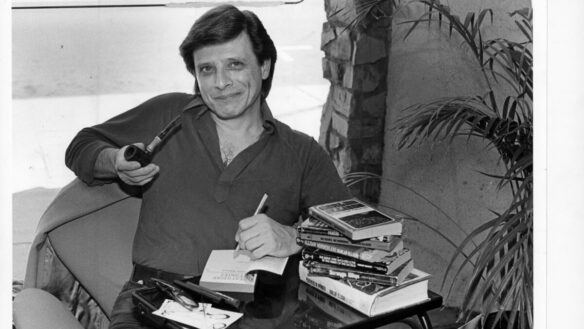
Here’s something weird; in examining my life, I have found some strange and opposing parallels in my life and Harlan’s:
- Harlan was white and Jewish, I am black and raised catholic.
- Harlan was born in Painesville, Ohio (near Cleveland) and I was born almost directly southwest from him in the other corner of Ohio, in Cincinnati.
- In his youth, Harlan could recite, from memory, the starting lineup of the 1948 World Champion Cleveland Indians of the American League (now, thankfully, the Guardians). I can still name the Great Eight lineup of the 1975-1976 double World Champion Cincinnati Reds (AKA, the Big Red Machine).
- Harlan was well known as a double threat, writing fiction and non-fiction in great quantities. I am only known for my smaller amount of social activism in fandom and these columns.
- Harlan earned an enormous amount of money (by my standards) during his lifetime. I have never accepted a dime for anything I’ve written (so far).
- Harlan has won a ton of awards and accolades, I have (allegedly) won only one Hugo Award.
- Harlan relished performing for the public and being in the spotlight and the center of attention. And while I have given speeches and have spoken on both radio and television, I prefer observing than being observed.
- Harlan ADORED his Olympia typewriters and the way it felt when he was writing. I, on the other hand, am happy and grateful to be using word processors, tablets and laptops.
- Harlan often wrote in the nude. I, fortunately, never developed this habit.
- Harlan never had any children. I have a daughter (Hi, Laura!) and have been graced with four grandchildren; Lilly, Atlas, Navia and Bowie.
- Harlan (and his lovely partner in life, Susan) have left the building. And I remain, mourning their absence.
“The passion for revenge should never blind you to the pragmatics of the situation. There are some people who are so blighted by their past, so warped by experience and the pull of that silken cord, that they never free themselves of the shadows that live in the time machine…
And if there is a kind thought due them, it may be found contained in the words of the late Gerald Kersh, who wrote:”… there are men whom one hates until a certain moment when one sees, through a chink in their armour, the writhing of something nailed down and in torment.”
― Harlan Ellison, from The Essential Ellison: A 50 Year Retrospective
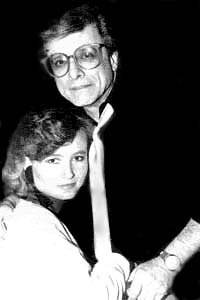
Harlan Ellison was not a perfect person. I have witnessed and read about his public mistakes and social faux pas. We know now, after the fact, that he suffered from a myriad of various illnesses and maladies. It does not excuse some of his behavior and we don’t need to recount them here. I tend to think he would loathe being called a role model for anyone or any cause.
I, too, have made mistakes in my life. I often cringe at the thought of them when I dredge them up out of my memory banks.
But here’s the thing; in the wake of those actions, for good or for ill, he strived to move forward. In the end, it was his will to do that, no matter what the odds, to do better and be better. And I have as well.
That’s a lesson that’s worth remembering.
“To say more is to say less.”
― Harlan Ellison
I do not consider myself to be a follower, disciple or an acolyte of Harlan Ellison. I am a reader and a writer.
To me, Harlan’s greatest legacy is as a teacher; to write clear and understandable prose, to stand up for what you believe, to give no quarter or comfort to those who would oppress another person’s rights and to rally against censorship, lies and disinformation at every opportunity.
How should we honor the memory of Harlan Ellison?
By remembering.
By remembering his countless acts of kindness towards his fans and colleagues.
By remembering his works and keeping them in print for others to discover.
By remembering that while you are alive, each day brings an opportunity to be better AND do better, for yourself, the people in your life and even for random people who need your help, today and every day that follows.
Remember Harlan Ellison’s epitaph, the very last words that he wanted to be known by:
“For a brief time I was here, and for a brief time, I mattered.”
-Harlan Jay Ellison, 27 May 1934 – 28 June 2018
Discover more from File 770
Subscribe to get the latest posts sent to your email.

Thanks for this, Chris
Thank you, Chris.
Very nice, Chris.
Beautiful.
Life is busy. I haven’t thought about Ellison in years. I like what I’ve read of his writing, but I’ve never been the been the fan others are.
It was always too easy to be distracted by the Performing Harlan. The outrageous stories and antics. The stories of the Harlan and Issac show at various cons. The weirdnesses of the fun house mirrors of his creations.
Thank you for reminding me of this person who was in this world for a while and did some good. As I contemplate where I am and where I’m going; what to do with a new opportunity, a new label for who I am to add to the labels I’m already wearing, this has been a good reminder that I also have opportunities to do some good here and there. That confused mess of a sentence is a reflection of the confusion I have about the possibilities around me. But whatever. Remember to do some good.
Make things better.
Thank you.
Very nicely put. Thanks. I never met him, and I don’t think I was ever present at anything with him, but this does help me know him aside from the stories and novels.
By an amazing coincidence, I was listening to a tape of Harlan from Iguanacon when I looked at File right now to see this column.
(I was also the first person who Connie WIllis talked to backstage, after Harlan had groped her onstage during the Hugo ceremony at L.A.con IV.)
I’ve heard about the groping, but don’t know what happened as told by someone who was actually there. Anything you care to share?
I probably had the worse view of the incident, since the only view I had was of their backs. (Anyone in the audience had a better view.)
I just know how upset Connie was when she came offstage.
Search “Harlangate” on Google. (A search on this blog will also return some info.)